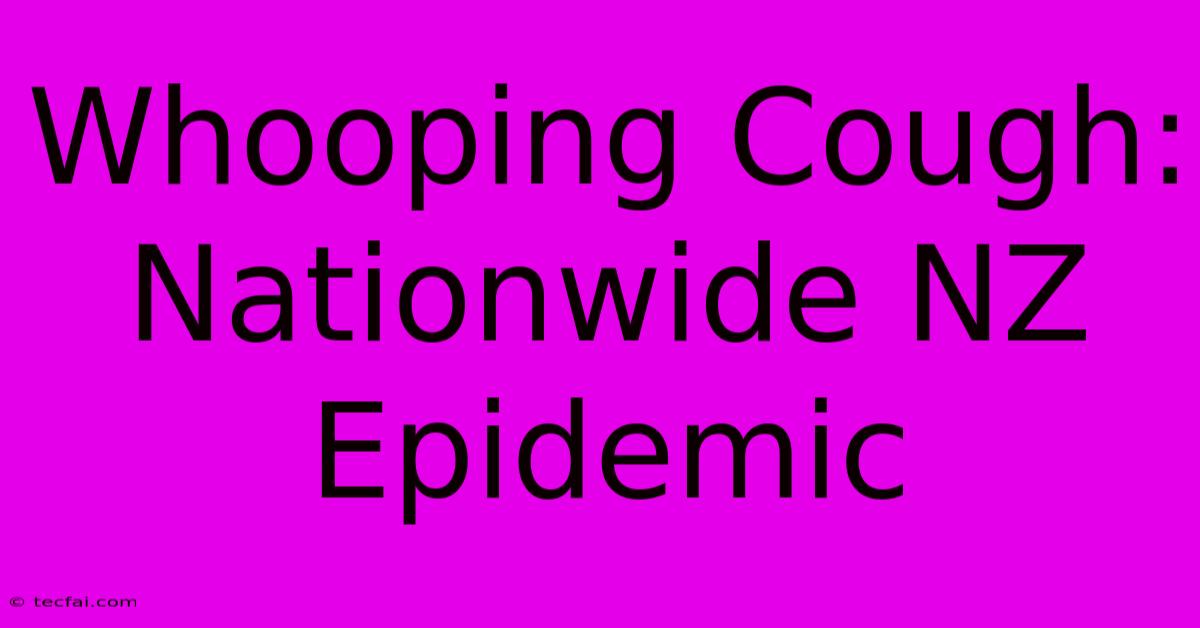Whooping Cough: Nationwide NZ Epidemic

Discover more detailed and exciting information on our website. Click the link below to start your adventure: Visit Best Website tecfai.com. Don't miss out!
Table of Contents
Whooping Cough: A Nationwide NZ Epidemic
New Zealand is currently grappling with a concerning rise in whooping cough cases, escalating to epidemic levels across the country. This highly contagious respiratory illness, also known as pertussis, poses a significant threat, particularly to infants and young children. Understanding the nature of this outbreak, its impact, and preventative measures is crucial for safeguarding public health.
Understanding the Pertussis Epidemic in NZ
Whooping cough is caused by the bacterium Bordetella pertussis. It's characterized by severe coughing fits, often followed by a "whooping" sound during inhalation. While the vaccine offers significant protection, its effectiveness wanes over time, contributing to the current surge in cases. This isn't just affecting unvaccinated individuals; even those vaccinated can contract the illness, albeit often in a milder form.
Factors Contributing to the Outbreak
Several factors are believed to be contributing to the nationwide epidemic:
- Waning Vaccine Immunity: The protection offered by the pertussis vaccine diminishes over time, leaving individuals susceptible to infection, especially as they age.
- Reduced Vaccination Rates: Fluctuations in vaccination rates, even slight decreases, can have a significant impact on community immunity, allowing the disease to spread more easily.
- Increased Transmission: Highly contagious, pertussis spreads easily through airborne droplets produced when an infected person coughs or sneezes. Increased social interaction and community gatherings can fuel transmission.
- Strain Variations: The emergence of new or slightly altered strains of Bordetella pertussis can affect the vaccine's effectiveness.
The Impact on Vulnerable Populations
Infants and young children are the most vulnerable to severe complications from whooping cough. They can experience severe coughing fits leading to:
- Apnea: Periods of paused breathing, which can be life-threatening.
- Pneumonia: Lung infection.
- Seizures: Fits or convulsions.
- Encephalopathy: Brain damage.
- Death: In the most severe cases.
Older children, adolescents, and adults may experience milder symptoms, but they can still spread the infection to those at higher risk.
Protecting Yourself and Your Community
Combating this epidemic requires a multifaceted approach emphasizing prevention and proactive measures:
Vaccination: The Primary Defence
- Staying Up-to-Date: Ensure you and your family are up-to-date with your pertussis vaccinations. Talk to your doctor about booster shots, especially if you have young children or are in close contact with infants.
- Vaccinating Infants: Protecting newborns is crucial. Infants typically receive their first dose of the DTaP (diphtheria, tetanus, and pertussis) vaccine at 2 months old.
- Pregnant Women: Pregnant women should receive the pertussis vaccine during each pregnancy to provide passive immunity to their newborns.
Beyond Vaccination: Additional Preventative Steps
- Hygiene Practices: Frequent and thorough handwashing, covering coughs and sneezes, and avoiding close contact with infected individuals are crucial.
- Early Diagnosis: If you suspect you or your child has whooping cough, seek medical attention immediately. Early diagnosis and treatment can help limit the spread and reduce the severity of illness.
- Community Awareness: Spreading awareness about the epidemic's severity and preventative measures within your community is vital in minimizing its impact.
Conclusion: A Collective Effort
The current whooping cough epidemic in New Zealand underscores the importance of community-wide vigilance and proactive measures. While vaccination remains the cornerstone of prevention, maintaining good hygiene practices and seeking timely medical attention are equally important. By working together, we can effectively mitigate the spread of this serious illness and protect the most vulnerable members of our society. Consult your healthcare provider for personalized advice and to ensure you and your family are adequately protected.

Thank you for visiting our website wich cover about Whooping Cough: Nationwide NZ Epidemic. We hope the information provided has been useful to you. Feel free to contact us if you have any questions or need further assistance. See you next time and dont miss to bookmark.
Featured Posts
-
Lacey Dalimontes Stage Designs For Roan
Nov 22, 2024
-
What Is The Iccs Power Israel Case
Nov 22, 2024
-
Indias Bowling Mastery Australias Collapse
Nov 22, 2024
-
Putin New Missile Used In Ukraine Attack
Nov 22, 2024
-
Perth Test Umpires India Australia
Nov 22, 2024
